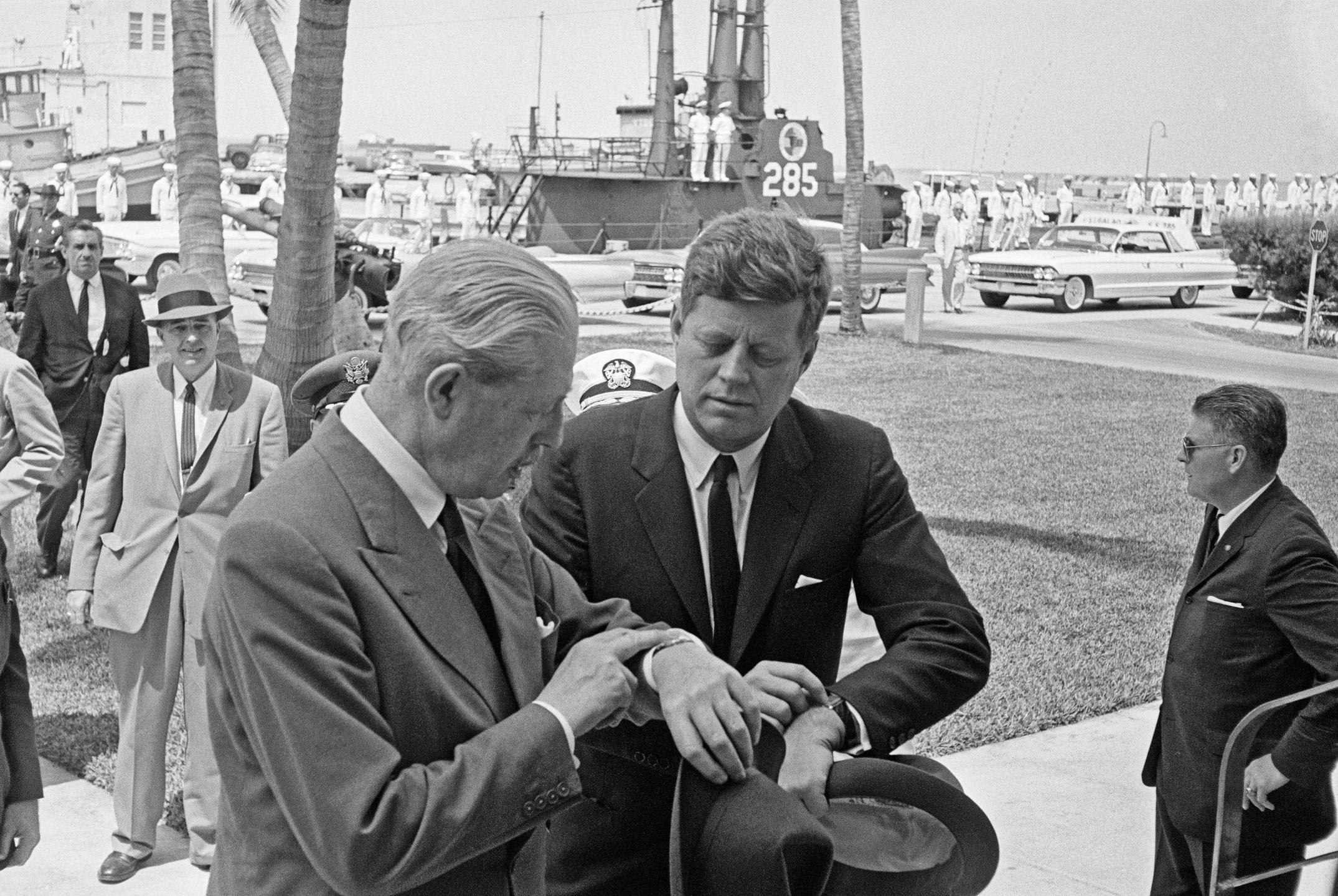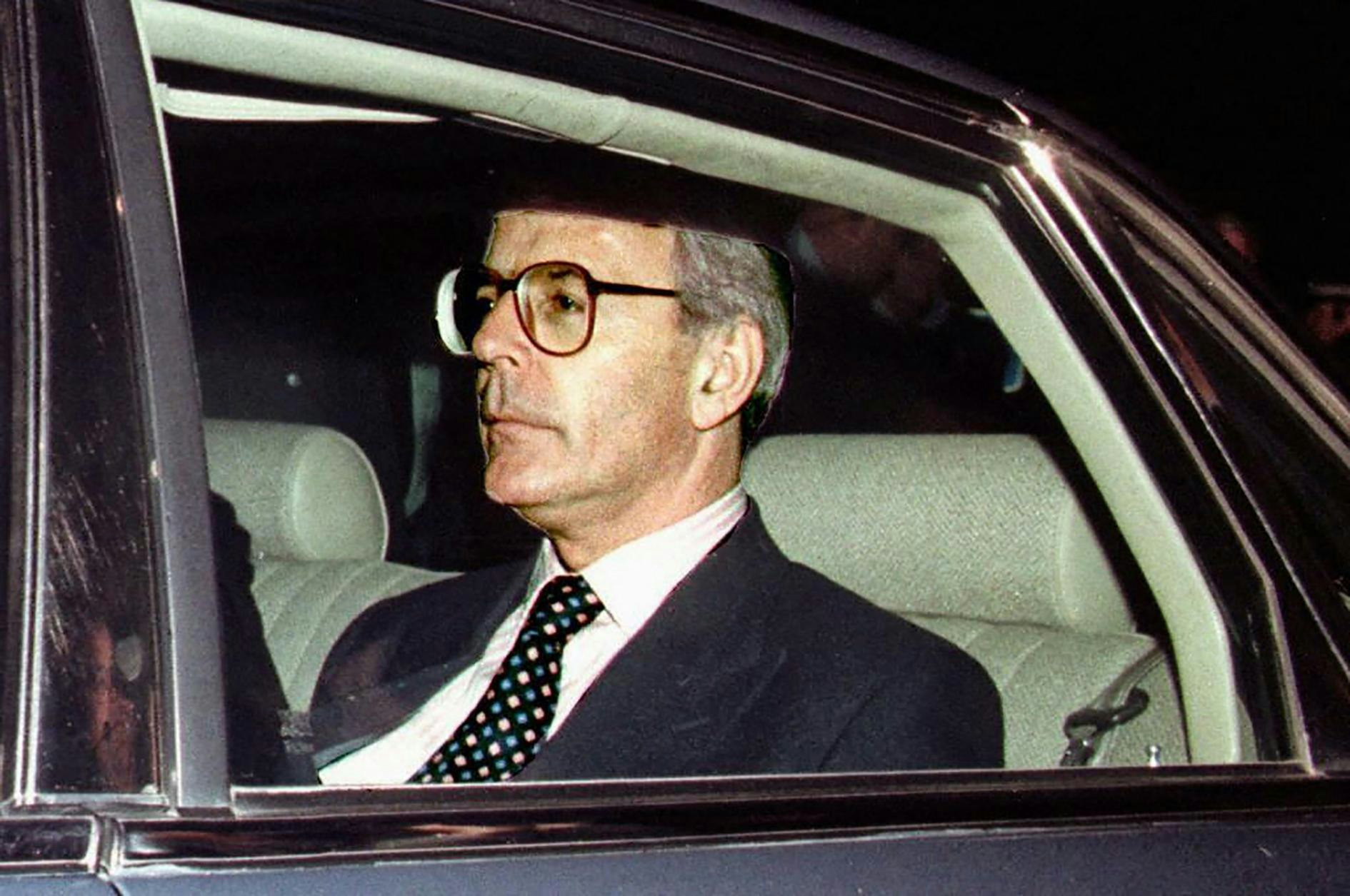This article is taken from the August-September 2025 issue of The Critic. To get the full magazine why not subscribe? Right now we’re offering five issues for just £25.
The stage is set. The Tories have failed in their policy towards Europe. Or rather, Europe has let them down. The Prime Minister departs for Chequers where courtiers explain what went wrong and how things could yet go right. But it’s not March 1990, and Norman Stone isn’t explaining to the arch-Cold Warrior, Mrs Thatcher, that a reunified Germany was what she had been fighting for.
Stone would go on to recant his generosity to the Germans. Writing six years after Charles Powell’s minutes of the meeting with George Urban, Timothy Garton-Ash, Gordon Craig and Lord Dacre were leaked, he said: “Now, as often happened, Thatcher’s instincts were on the right lines, and we were wrong. There are more grounds for worrying about Germany than we allowed for.” That was 1990 viewed from 1996 — so amidst the Beef War and all the tawdry rest of John Major’s “empty chair” phase of constructive good Europeanmanship.
But our first pick from the many Chequers awaydays reviewing British European failure comes in 1959. Alan Milward’s entertaining The Rise and Fall of a National Strategy, 1945–1963 details the scene after Harold Macmillan begins to turn towards the “six” (the EEC) and away from the “seven” (the European Free Trade Association, of which Britain was a member).
It is now forgotten that, for London, the drama isn’t simply about what was left of the empire or the relationship with the countries with whom Britain then shared a sovereign, people, trade and defence, such as Canada and Australia. It was how Britain sought to manage France.
Would we give her nuclear weapons? Might we secure for her SACEUR — the top military job in NATO — and turn the alliance into a triumvirate, reconciling a disruptive Paris to this vital anti-Soviet work? Could something be done for this wreck of a country, militarily humiliated just five years previously by the North Vietnamese at Dien Bien Phu?
Only De Gaulle’s return to power a year ago had seemingly averted his country’s slide into the fate the Foreign Office predicted for it as a bigger version of Franco’s Spain but less stable. Over the previous 12 months, France had risked civil war, a military coup and the upending of her constitutional order. Her amputation from French Algeria was still three years away, in 1962.
So all-consuming has British elite self-hatred become that it is now almost impossible to comprehend the disparity in power, comfort and options in front of the British, compared to the dismal circumstances and unenviable choices that continental countries then faced. Yet Macmillan didn’t like what he was intending to do. Britain’s application to join the EEC was a defeat rationalised.
The Prime Minister was neither in any doubt about that nor about who was to blame for why the EEC was so disagreeable: its supranationalism being, in the words the official minutes of the Chequers meeting attribute to the PM, the fault of those who “were playing no small part in the Commission — the Jews, the Planners and the old cosmopolitan element”.

Even worse were the Kennedys, Macmillan’s sometime semi-in-laws. Despite Macmillan making clear to JFK the demerits of the EEC as it actually existed, the official US minutes of the PM’s chat with the President in 1962, a year after Britain had finally applied to join (and De Gaulle had vetoed for the first time), are stark: US support depended upon the UK “fully [accepting] the political and institutional obligations of the Rome Treaties”.
And thus we have our first Powellite lesson: the EEC was, for Britain, an American project. We tried to join it because we thought doing so curried favour with Washington; our entry was as they wished it. They did not make it happen: we did that. We responded to our post-imperial situation with decisions we thought were in our interests, but our Cold war (and quintessentially post-Suez) calculus was, “How does this play in DC?” That was our European strategy. It was not that of France whose strategy (so admired by the young Henry Kissinger) was precisely the opposite — to make America sweat for her relationship with it.
In Between the Waves: The Hidden History of a Very British Revolution 1945–2016 (Picador, due to be published in September), the New Statesman’s editor-in-chief Tom McTague has written an extremely ambitious account of how we came to leave the European community that Macmillan failed to join. It will be reviewed in our October issue by one of the three men indispensable to making Brexit happen (the other two are Boris Johnson and Jeremy Corbyn).
But to boil it down, by McTague’s account, Cambridge thought it, and Oxford did it. Enoch Powell is intellectually central in this telling; he’s embedded in the story that Maurice Cowling’s Peterhouse Right told, and then some fairly unsavoury Oxford Union types, as Maurice might have put it, ballsed up doing the thing that the people always turned out to want done.
Indeed, Cowling would have been delighted that most of the senior politicians who formally did Brexit — leading the Leave campaign, implementing the Brexit result — neither expected the result nor wanted to deliver on it. This was high politics at its archest, and it’s little wonder the country went slightly mad, watching so clearly a few dozen men and women manoeuvre for position using a totem for which almost none of them felt any true sympathy.
Here then is how we did the thing so few of us wanted done, after the wave crashed ashore.
Guilty men
Before we come onto how, there’s first always why. Or at least, that’s the way histories tell it. It’s absolutely not how politics, let alone history happens. But let us submit to convention. Why did any of us want done this thing which came to be called Brexit? One way to understand that is to see what the other side thought. As we Brexiteers never tired of saying, no side stood more in contradistinction to us than our famously apolitical Rolls-Royce civil service.

Take Sir Stephen Wall: former private secretary to Sir Geoffrey Howe, John Major and Douglas Hurd as Foreign Secretary and arch-foe of the Bruges speech being delivered. Then he was foreign affairs private secretary to Major as PM, then our permanent representative in Brussels and finally Blair’s civil service advisor on Europe. He has since gone on to be the Cabinet Office’s official historian of our relationship with the EU. I shall now surprise you with his views, lightly held as they were.
In Wall’s 2008 A Stranger in Europe: Britain and the EU from Thatcher to Blair, you get the official line: “Britain’s biggest mistake was to join too late.” This begs questions: what could and should we have changed if we had joined earlier? What was wrong with this community you were so keen for us to join that we ought to have changed it, had we but been able to? Just how bad was the unchanged thing we joined? To Eurosceptics, all Wall and his acolytes seemed to mean by “too late” was that we should have agreed with the Europeans sooner and harder.
Wall — writing in 2008, remember — sincerely thought that we had “contributed so much” to the EU. But here is a mystery that can now be investigated: for how have they got on without us? How, specifically, have they got on without the gifts that men like Wall brought to bear via things like UKRep? Never mind the catalogue of upstream wins for Britain our civil servants were never so vulgar as to reveal, how has the EU fared sans Britain?
We were in to have influence; our influence was removed: what, for the EU, have the consequences of that been? If we had acquired, then lost influence, the fruits of its absence ought surely now to be visible. Yet they never are, not least in the telling of permanent Remainers, who are unfailingly insistent on the superiority of the Britishless EU. Leaving was our mistake, not theirs: we have suffered from it; they have not.
If our being a member did nothing for the EU, did it perhaps do much for us? Are British advocates of membership essentially grown-ups gulling simple, unhealthy children into taking very necessary medicine? Thus Britain, with all her chronic problems, needed EU membership in a way the EU did not need us. To this Brexiteers insist that we were wrong to go in, we were mistaken to stay in and, that being so, we should have got out far sooner.
The role of anti-communism
Tom McTague is very good throughout his book on bogus inevitability. It takes real effort to see what didn’t happen and realise its significance. Take the Schuman Plan: McTague gets that, for France, this was them looking to the US-still-in-Europe, rather than a bankrupt Britain, as their backstop against German revanche.
Ordinarily minnows binding a giant would not have been an option, but this American continental commitment was as if Alexander I’s Russia had stayed in Paris after the Napoleonic wars: the game could now be played in different ways because there were new rules. They were still backed, of course, by force, but it was American, not German — actual or latent.
Another inevitable thing that didn’t happen was the European Defence Community. The French rejected it precisely because it was too federal for them and would have required giving up the real stuff of power and autonomy. They spurned it, and, Compulsory Atlanticism notwithstanding, they got away with it. This was not to be the only time.
Where McTague is wrong is to assume throughout that Britain was “in a bind”. We only were so if we had to be in the EEC. Brexiteers would counter that, being out, as we now are, rather demonstrates staying out’s perpetual viability. As Powellites and others argued, whatever need the Europeans had for Community membership, Britain did not possess it.
What separates us from them is that the reality of German strength is not the same threat to Britain that it is to Europeans: they are scared of it (up to and including the Germans, who saw themselves wrecked by their own power). Fear of Germany is the motor of integration, yet the British are not frightened by Germany, however much late-period Norman Stone suggested that we might want to consider being so.
It was Suez that caused the fatal divergence between Britain and France: they rightly concluded that we had chosen the vassalage they rejected. Nothing about Suez was inevitable, not least the Americans panicking before their presidential election and taking such vast and unnecessary risks with their entire Cold War strategy. They could so easily have squandered their first and second allies in a supposedly existential global struggle — and over something as a slight as a canal. Britain could have turned on the US à la France. Equally, had the British held out until Eisenhower was re-elected, the Americans could have plausibly course-corrected (and saved themselves half a century of Middle Eastern pain).
Locked into a fundamentally American conception of the Cold War — from which the French freed themselves — one aspect that is very hard to comprehend now is how central anti-communism was to right-wing British support for Common Market membership. When in 1991 the USSR collapsed, so many of the doubts Tories had suppressed about why we were in this thing started bubbling back to the surface. Until then, the scepticism on the Right had been confined to Cold War sceptics such as Powell and Cowling.
Domestically, the political collapse of socialism allowed, or obliged, Labour to become the European party instead. Jacques Delors supplied a purpose that the soft left leaders (who had so narrowly seen off the SDP) grasped at. We should not fall for the idea, however, that “Europe” brought down Thatcher. Domestic unpopularity did this; Europe was a pretext her political opponents seized on to justify what they wanted to do to hang onto power at home.

The implosion of Major’s shabby government brought Tony Blair to power, and there seems little reason to doubt that had he not been mad enough to needlessly join America’s catastrophic post-9/11 wars, he’d have had the political capital to secure British euro membership instead, against opposition as weak as William Hague and Iain Duncan Smith. Maybe, in turn, this would have accelerated Brexit, with British membership being unsustainable at home. Or perhaps we’d have been defended as the “Francfort” was (when the markets very pointedly did not break the Franco-German end of the ERM).
McTague basically sees scepticism about immigration as being doctrinally Powellite too. I see it much more prosaically: it grows as an issue because it grows as a fact. The key difference Europe made was that because it was now whiter, it could be talked about so much less fraughtly.
Set free
Brexiteers told the truth and won. We should realise that the former did not lead to the latter: they were happy coincidences. Much of what we said was wrong. Most pointedly, the “superstate” that we said we must flee before it became too binding has not been built. In fact, I’d argue the EU is in something like its end state. Which may endure for some time, but it won’t abolish, say, France.
British Remainers still can’t see that what’s good and necessary for Europeans is not what’s necessary for us. But this war is won: there’ll be no getting the UK back in. Good British Europeans had half a century to make membership indispensable: they failed utterly.












